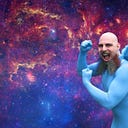No, we haven’t finally found evidence for a parallel Universe
The ANITA experiment found cosmic rays shooting out of Antarctica. One interpretation claims “parallel Universes,” but is that right?
For some of us, the idea of parallel Universes spark our wildest dreams. If there are other Universes where certain events had different outcomes — where just one crucial decision went a different way — perhaps there could be some way to access them. Perhaps particles, fields, or even people could be transported from one to the other, enabling us to live in a Universe that’s better, in some ways, than our own. These ideas have a foothold not only in science fiction, but in theoretical physics as well, from the infinity of possible outcomes from quantum mechanics to ideas related to the Multiverse.
But do these ideas have anything to do with observable, measurable reality? Recently, a claim has surfaced asserting that we’ve found evidence for parallel Universes from the ANtarctic Impulsive Transient Antenna: ANITA. It’s true: the experiment found evidence for cosmic ray particles that’s quite difficult to explain using only conventional physics. But to leap to the most fantastical, outlandish, revolutionary explanation is absolutely premature. In all fields of science, we have to take tremendous…

